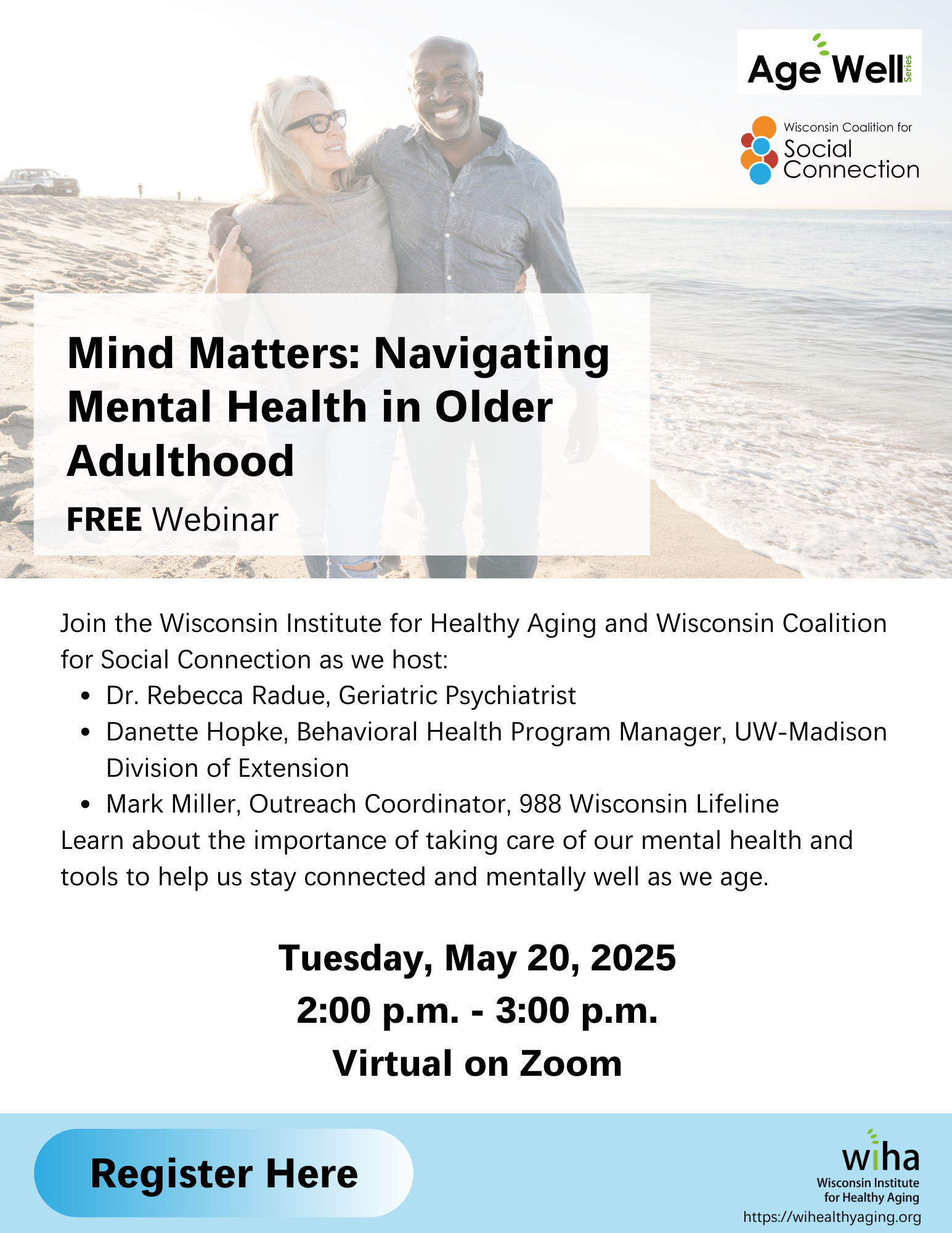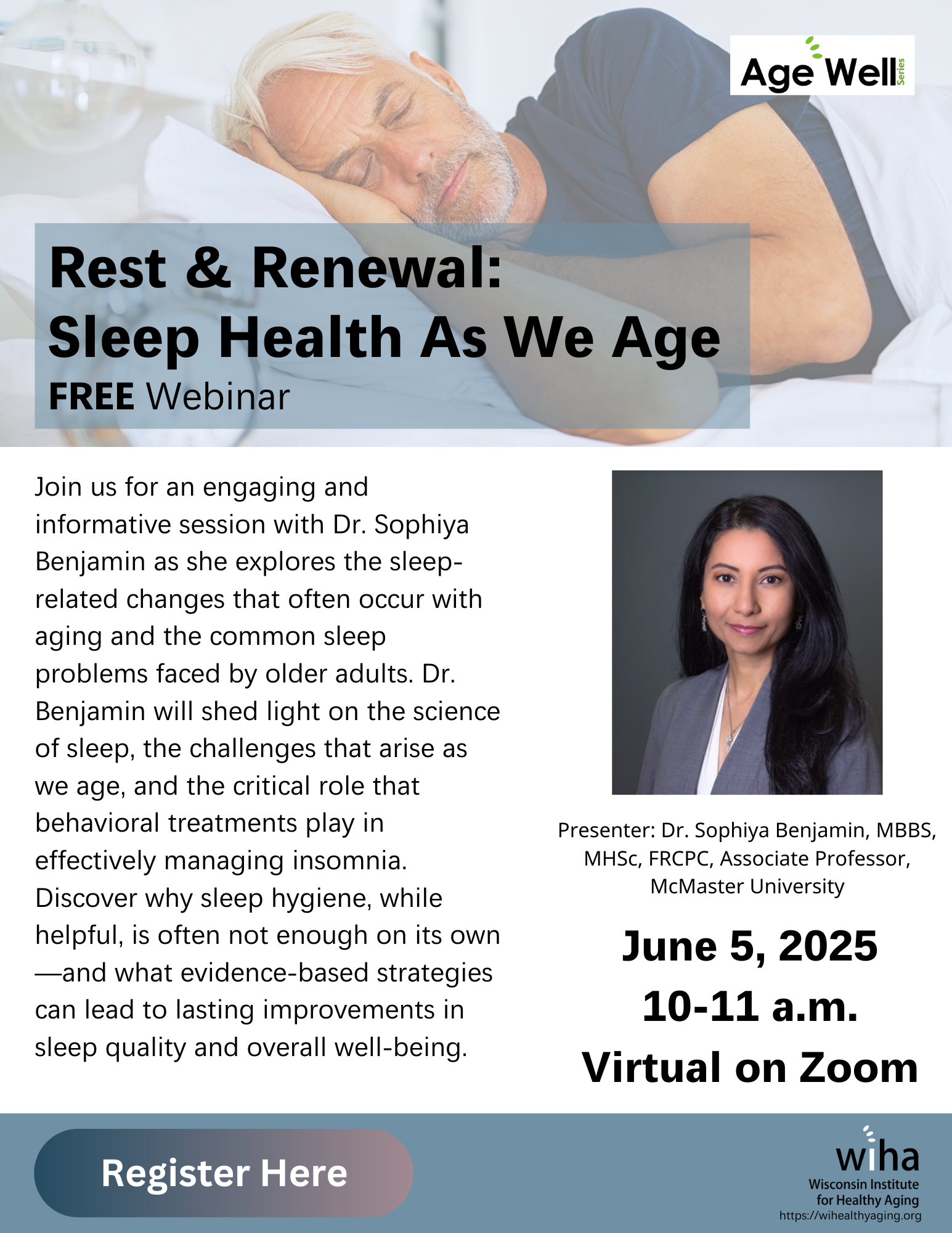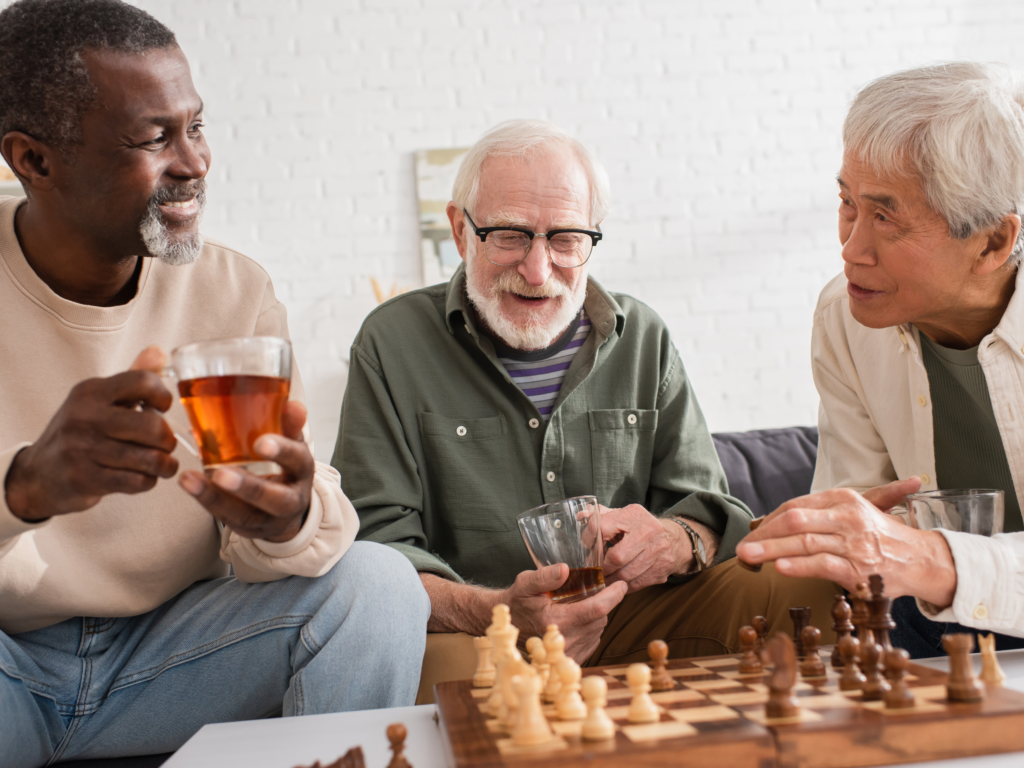
Age Well with WIHA
A newsletter from the Wisconsin Institute for Healthy Aging
Age Well with WIHA: May/June 2025
WIHA’s newsletter is published bi-monthly and sent by email. View the email newsletter online or read the full stories below. Don’t forget to subscribe!
Ageism is Everywhere
And It’s Hurting Our Health
Ever heard the term ageism? It was first coined by Dr. Robert Butler back in 1968, the same doctor who wrote Why Survive? Being Old in America. Ageism refers to the stereotypes, discrimination, and bias people face simply because of their age — especially older adults.
And ageism is everywhere.
From “anti-aging” creams to hair dye ads, to joke cards that mock growing older, our culture constantly sends the message that aging is something to hide or be ashamed of. Flip through TV channels, scroll through your social media, or look at who appears in commercials — older adults are rarely visible. And when they are, they’re often portrayed as forgetful, frail, or out of touch.
The Advertising Gap
One of the most striking examples of ageism? Advertising.
Think about it: How often do you see someone over 50 in a car commercial? Not often, right? Yet AARP shares that people 55 and older buy 56% of all new cars and trucks, 68% of home maintenance and repair, and 55% of personal care products. Still, older adults only appear in 15% of online advertising and are 7x more likely to be portrayed negatively. A marketing study by Age of Majority reports 58-66% of people believe a common stereotype that people over 50 spend less money. However, the same study shows older adults spend more than double what those under 35 spend and almost as much as those 35-54 years. Failing to market to older adults is leaving nearly $3 trillion dollars of revenue unspent. That’s a massive, powerful group being largely ignored — or worse, insulted — by modern marketing.
The Real Cost of Ageism: Your Health
Beyond being disrespectful, ageism can actually be dangerous to your health. Dr. Becca Levy from Yale University (author of Breaking the Age Code) has spent years studying this, and her findings are eye-opening:
- Older adults with positive attitudes about aging are 44% more likely to recover from serious disabilities.
- They also have better memory and slower physical decline.
- People who believe aging means inevitable decline are less likely to visit doctors regularly, get vaccines, or follow healthy habits like taking medications or using seat belts.
- Even young people who hold negative views about aging are more likely to develop heart problems later in life.
On the flip side, people with positive self-perceptions of aging live, on average, 7.5 years longer than those with negative views. That’s a huge impact — all from how we think about aging!
So, What Can We Do?
The first step? Rethink how we talk about aging — and how we treat older adults (including ourselves!).
Watch your words. Phrases like “She’s 80 but still sharp” or “He’s 75 and still working” might seem like compliments, but they suggest that most older people aren’t sharp or capable. Instead, celebrate people’s lives without the surprise factor.
Ditch the “you don’t look your age” comments. Telling someone “you don’t look 70” might sound flattering, but it implies that looking 70 is bad. Let’s embrace aging as something natural and valuable — not something to hide.
Speak up. When you see ageist content — whether it’s in jokes, ads, media, or greeting cards — call it out. Let companies know you notice. Buy birthday cards that celebrate aging, not mock it. And don’t shy away from showing your own age proudly.
It’s Time for an Anti-Ageism Movement
We need to create a culture that values people at every age — in the workplace, in media, in healthcare, and in everyday life. Let’s start that movement here in Wisconsin — and across the country. Because treating aging with dignity and respect isn’t just right — it’s good for your health.
Incontinence: Common, but Not a Normal Part of Aging
Incontinence—loss of bladder or bowel control—is something many people experience, but not enough talk about. It might show up as occasional leakage when you laugh, sneeze, or exercise, or as a sudden, urgent need to go that’s hard to control. Sometimes, it can mean full loss of control.
Here’s the good news: while incontinence is common, it’s not something you just have to accept. In many cases, a few simple lifestyle changes can make a big difference.
How Common is Incontinence?
Over 25 million adults in the U.S. experience incontinence—and that’s just those who report it! It affects people of all ages, but it’s more common among women and older adults. Surprisingly, many people don’t seek help:
- Only 50% of women with urinary incontinence talk to their healthcare provider.
- For accidental bowel leakage, that number drops to 30%.
That means millions are suffering in silence—but they don’t have to.
Here’s a quick look at how it affects different groups:
- Women: Up to 50% experience incontinence at some point.
- Men: About 1 in 5 deal with it.
According to John Hopkins Medicine, incontinence becomes more common in women over age 50—but again, that doesn’t mean it’s just “part of aging.”
Types of Incontinence
There are four main types of incontinence, each with different causes and solutions:
- Urgency Incontinence
A strong, sudden urge to urinate and trouble getting to the bathroom in time.
- Stress Incontinence
Leakage during activities that put pressure on your bladder—like coughing, sneezing, laughing, or exercising.
- Functional Incontinence
Difficulty making it to the bathroom in time due to a physical condition—such as trouble standing up quickly or limited mobility.
- Overflow Incontinence
When the bladder gets too full and can’t hold all the urine, leading to leakage.
It’s Common, But It’s Not Normal
Incontinence may be widespread, but it’s not something you have to live with. There are effective ways to manage or even prevent it.
A great place to start is with the Mind Over Matter: Healthy Bowels, Healthy Bladder (MOM) program. Designed for women, MOM covers the impact of fiber and fluid, pelvic floor exercises, and other strategies to reduce or prevent incontinence.
When Should You Talk to a Doctor?
According to the Mayo Clinic, it’s time to speak to your healthcare provider if:
- Incontinence is negatively impacting your daily life.
- You’re avoiding social plans or activities because of it.
- You’re rushing to the bathroom, which increases your risk of falling.
- You’re experiencing other symptoms that could point to an underlying condition.
You’re Not Alone—And There’s Help
If you’re dealing with incontinence, know that you’re not alone—and you don’t have to suffer in silence. With the right tools, information, and support, you can take control and live confidently.
In this Issue
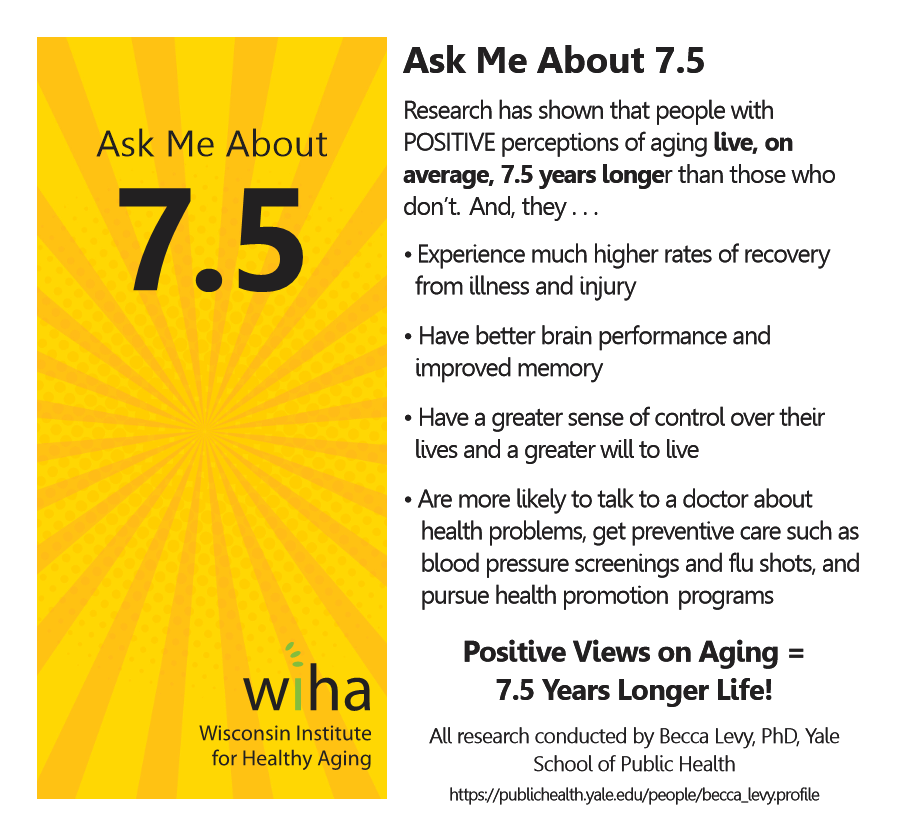
Your Support Helps Older Adults Thrive
At the Wisconsin Institute for Healthy Aging (WIHA), we work with organizations across the state to offer programs empowering people across Wisconsin to prevent falls, manage chronic conditions, and take charge of their well-being.
But we can’t do it without you.
Your gift helps us reach more communities with life-changing workshops and resources. It means one more grandmother stays on her feet, one more neighbor learns to manage their diabetes with confidence, one more person finds connection and purpose.
When you give to WIHA, you’re not just making a donation — you’re investing in a healthier future for all of us as we age.
Will you join us in building a stronger, healthier Wisconsin?
Make your gift today and be a part of the movement for healthy aging.
Thank you for being a friend to WIHA and a champion for healthy aging!
Find a Workshop
Take charge of your health by taking a WIHA workshop. We offer in-person and virtual (online or by phone) programs that give you the tools to age well. Getting started is easy – simply click the link below.
Featured Program: Mind Over Matter: Healthy Bowels, Healthy Bladder
Mind Over Matter (MOM) is an interactive and fun workshop designed to prevent or improve bladder and bowel symptoms. A trained facilitator leads the 3-session (2 hours per session) workshop that meets every other week. Participants work together to set and meet personalized goals and create a feeling of self-confidence in their ability to avoid or reduce incontinence symptoms.
Research: Mind Over Matter was researched and shown to improve bladder leakage symptoms in 71% and improve bowel leakage in 55% of participants. In addition, the program may decrease the reliance on incontinence-related products, medications, and even surgeries.
Who is it for: Mind Over Matter was designed to help women over 50 build the skills and confidence they need to prevent or improve incontinence symptoms.
How to participate: You can participate in Mind Over Matter in-person or virtually. Find a workshop near you.
“Since taking Mind over Matter, my urine leakage problem is so much better. Thank you for helping.”
Participant
Wisconsin
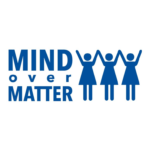
Enjoyed the newsletter? Subscribe today!

